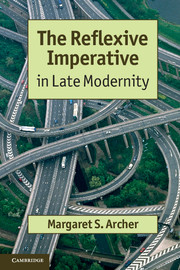Book contents
- Frontmatter
- Contents
- Figures
- Acknowledgements
- Introduction
- 1 A brief history of how reflexivity becomes imperative
- 2 The reflexive imperative versus habits and habitus
- 3 Reconceptualizing socialization as ‘relational reflexivity’
- 4 Communicative reflexivity and its decline
- 5 Autonomous reflexivity: the new spirit of social enterprise
- 6 Meta-reflexives: critics of market and state
- 7 Fractured reflexives: casualties of the reflexive imperative
- 8 Conclusion
- Methodological appendix
- Index
- References
5 - Autonomous reflexivity: the new spirit of social enterprise
Published online by Cambridge University Press: 05 June 2012
- Frontmatter
- Contents
- Figures
- Acknowledgements
- Introduction
- 1 A brief history of how reflexivity becomes imperative
- 2 The reflexive imperative versus habits and habitus
- 3 Reconceptualizing socialization as ‘relational reflexivity’
- 4 Communicative reflexivity and its decline
- 5 Autonomous reflexivity: the new spirit of social enterprise
- 6 Meta-reflexives: critics of market and state
- 7 Fractured reflexives: casualties of the reflexive imperative
- 8 Conclusion
- Methodological appendix
- Index
- References
Summary
The autonomous reflexives are subjects who both seize the situational logic of opportunity and, already as undergraduates, are deliberating about occupational outlets for themselves. Their aspirations constitute a new mediatory mechanism that is registering an impact on corporate recruitment and multi-national practice. On the one hand, the attraction to most of being able to fund an ‘expensive lifestyle’ partly accounts for why they are forthcoming as applicants, even from a discipline like sociology. On the other hand, all of these subjects have well-articulated social concerns that cannot be attributed to their exposure to the social sciences, since most already displayed them at point of entry. Obviously, the effects of self-selection should not be underestimated for the subjects interviewed. Nevertheless, since sociologists are a small minority of such applicants, their presence cannot explain the complicated self-presentational pavane currently danced by representatives of multi-national capital: their veneer of environmental concern, pro bono initiatives for the underprivileged and projects for improving the immediate surroundings of their enterprises. Presenting the caring face of the corporation is probably more of a response to collective action and critique but a crucial consequence is continuing to keep a new generation of applicants coming forward. Autonomous reflexives, deliberating according to instrumental rationality, are those who replenish the cadres of homo economicus and the new administrative ranks of homo sociologicus. As the source of new recruits, further and sometimes cosmetic concessions can be made to their tender spots.
However, as active agents, these new applicants and recruits also have their own agendas. None of those interviewed was considering more than five to ten years of multi-national corporate employment. What they sought were the high earnings that would establish them – as debt-free, as home owners, as high livers from the start – on which foundations they could then respond to the evergreen attraction to autonomous subjects of starting their own self-employed enterprises. If the buzz of current corporatism was certainly no disincentive, the old pull of being in sole control retained its past vigour.
- Type
- Chapter
- Information
- The Reflexive Imperative in Late Modernity , pp. 166 - 205Publisher: Cambridge University PressPrint publication year: 2012



